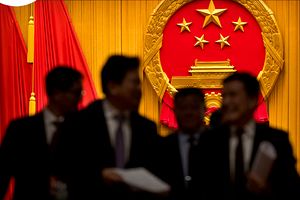On March 3, China kicked off its national “Two Sessions” — the annual plenary sessions of the National People’s Congress (NPC) and the National Committee of the Chinese People’s Political Consultative Conference (CPPCC).
This year’s “Two Sessions” will last until March 20, or 15 and a half days, remarkably longer than usual.
It’s obvious that the Chinese Communist Party (CCP) is well-prepared to defend its controversial decision to scrap the two-term limit for the presidency in China’s constitution.
On March 4, Zhang Yesui, the newly appointed spokesman for this year’s NPC as well as executive vice foreign minister since 2012, hosted the first press conference for the NPC meeting. He explained that this year’s session is longer than normal because of the unusually full agenda. Besides the usual items such as reviewing the government work report and examining the national budget, the NPC will also ratify the draft revision to China’s constitution proposed by the CCP, pass the draft supervision law to set up a powerful anti-corruption agency, review a reform plan for State Council institutions, and approve major personnel appointments across the country.
Zhang introduced that the NPC is scheduled to vote on the draft constitutional amendments in the morning of March 11.
Then in the afternoon — “immediately after the draft is approved” — a special press conference on the constitutional amendment will be held at the Great Hall of the People, Zhang emphasized.
During the question-and-answer session, the first question — asked by a Chinese journalist — was about the proposal to amend the constitution.
It’s an open secret that all questions asked by Chinese journalists during such high-level press conferences are either directly designated or approved in advance by Chinese officials.
Unsurprisingly, then, in response to the question, Zhang provided a lengthy, detailed, and full-of-political-jargon explanation as to why the CCP decided to amend the constitution now.
“The constitution, which reflects the common will of the Communist Party of China and Chinese people, is China’s fundamental law and the general chapter for governing the country well and ensuring national security,” Zhang said. “It is necessary to appropriately amend the constitution to incorporate major theoretical, practical, and institutional achievements made by the Party and the people in order to give better play to the constitution’s critical role in upholding and developing socialism with Chinese characteristics in a new era.”
He also stressed that “upholding the leadership” of the CCP should be the top principle for amending the constitution.
However, he intentionally didn’t touch upon the most controversial point — the removal of presidential term limits — until a CNN journalist pressed him again.
Speaking more briefly this time, Zhang explained that neither the CCP’s constitution nor the state’s constitution stipulates term limits for the general secretary of the CCP Central Committee or the chairman of the Central Military Commission. (Chinese President Xi Jinping currently holds those two positions as well.)
“To make the constitutional provision concerning the president conform with the aforementioned practices,” Zhang claimed, “is conducive to safeguarding the authority and the centralized and unified leadership of the [CCP] Central Committee with Xi Jinping at the core, and to strengthening and improving China’s leadership system.”
Notably, Zhang didn’t clarify whether Xi will hold the presidency for life.
Just ahead of the Two Sessions, on March 1, the CCP’s mouthpiece, the People’s Daily, published a 4,500-plus word commentary defending the CCP’s decision to amend the constitution. It said that “this amendment does not mean changing the retirement system for party and national leaders, and does not mean a life-long term system for leading officials.”
This commentary, written by “Xuan Li,” which is widely seen as a pen name for the CCP’s Propaganda Department, is so far the only semi-official clarification that the decision to scrap term limits won’t necessarily allow Xi to serve for life. Even so, this brief sentence was buried within tons of political propaganda wording.
Based on Zhang’s latest remarks as well as the People’s Daily article, there is little doubt that the NPC will agree to scrap the two-term limit for the presidency in China’s constitution, in spite of harsh opposition at home and abroad. This year’s unusually long “Two Sessions” are thus doomed to go down in China’s contemporary history.

































